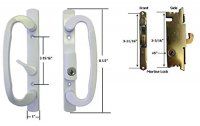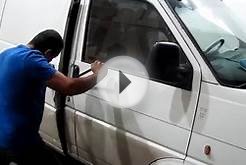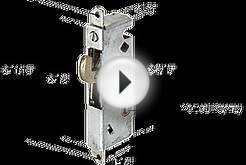3:67 || LOCK MESS MONSTER:
You try to open your front door but the key sticks as if you were pushing it into a wad of chewing gum.
THE QUICK FIX
Over time, lock tumblers can become misaligned and clogged with all kinds of gunk. The way to ensure your key makes a clean entrance and exit every time is by providing effective lubrication that won't add to the gunk. The best is powdered graphite. Also check frequently used keys for roughened edges. Gently and carefully use a nail file to smooth burrs off the key tip.
3:68 || COLD WAR:
Anyone who has lived in a cold climate knows that frozen locks go with the territory.
According to David Lowell, CML, CMST, and Director of Training and Certification for the Associated Locksmiths of America, it's a matter of bringing the heat. "If the lock to your house is iced over, remove the ice from the opening of the lock cylinder and carefully heat the key with a match or lighter. If you don't have a match or lighter, place the key on your car's engine block or radiator until it's very hot. Holding the key with your gloves on to avoid burning your fingers, insert the key into the lock and work it gently back and forth until the ice melts and the cylinder turns."
3:69 || SAFETY'S SAKE:
The lock on your sliding glass door (if it exists at all) is about as substantial a theft deterrent as a picture of a guard dog.
Cut down a broomstick or mop handle to fit snuggly in the floor channel in which the doors slide open or closed. When in the channel, the stick will jam and prevent anyone from opening the doors.
3:70 || HIDDEN FEATURE:
You're ready to remove a defective lockset, but how you begin to get it the darn thing off the door is a major mystery.
For the sake of aesthetics, most standard locksets (those with doorknobs, not handles) mount the knob with hidden screws, making it appear as if there is no way to remove them short of a crowbar and large hammer. But save yourself the cost of a new door. If you look underneath on the stem of the knob itself, you'll find a tiny hole. Just insert a small pry tool, such as a thin straight screwdriver, and pull on the knob to remove it. Work the faceplate off and the mounting hardware will be accessible underneath.
3:71 || CRACKED TEETH:
Someone-not you, surely-has broken a key off in a door lock, which is now jammed shut.
Use a grinding wheel to shape an old hacksaw blade into a harpoonlike point. Then, slip the point into the lock over one of the key nubs and use the hook to fish it out.
3:72 || NUMBER CRUNCHER:
You're in a hurry to get to tennis class when you realize that you've forgotten the combination for your locker's combination lock.
If your lock is of fairly recent vintage you're in luck. Chances are the manufacturer has the combination on file, keyed to the code number on the lock. Visit the manufacturer's website and you're likely to find a FAQ section dealing with recovering lost combinations. Some manufacturers even offer online registration so that if you do forget the combination, you can easily retrieve it.
3:73 || LOCKED OUT:
You've finally set aside an afternoon to clear out that storage shed that hasn't seen the light of day in a year. But now you discover the padlock is rusted shut.
Immerse the lock in kerosene or penetrating lubricant for 24 hours. If the lock is attached to the hasp of a garage, gate, or other structure, this will mean wiring a metal can full of kerosene to the structure to allow the lock to soak in place.
FIX OR DITCH?
The case for a new lockset.
A lockset is the mechanism by which you open and secure a door. Despite the name, locksets may not require a key. Privacy locks, usually used for bathrooms or bedrooms, may have a simple turn or push-button lock.
There are three basic reasons for replacing a lockset. In some cases, the lockset is malfunctioning and may have failed. More commonly, homeowners look to upgrade from, say, a common "passage" lockset to a key-operated lockset. Changing locksets may also be a function of aesthetics, as homeowners change the style of their doors and other accessories and accents.
According to Tom Embriani of Black & Decker Hardware and Home Improvement Group, "Most modest locksets can be repaired with minimal effort and expertise, but older units may require replacement because parts are no longer available to repair them. Signs that you should replace a lockset include a lock that operates intermittently or requires multiple attempts to get it to lock, or a clunking or grinding noise along with a looseness in the cylinder (where you insert your key). If the lock simply refuses to turn, or the knob spins freely, components in the lockset are worn out or defective and it should be repaired or replaced."












Put a broomstick in the bottom track.
You don’t need to worry much if the lock of your sliding glass door suddenly malfunctions or gets broken down. Fixing it shouldn’t be that complicated. Here are some easy-to-follow steps so you can make the lock of your sliding glass door working perfectly again: